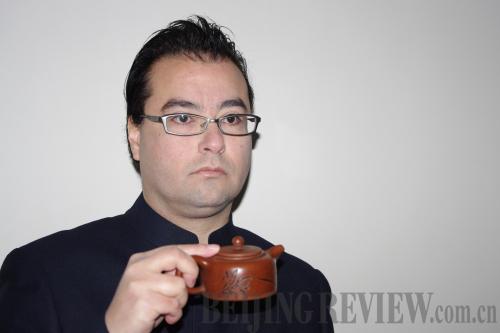|
 |
|
(COURTESY OF WARREN PELTIER) |
Warren Peltier squinted through the steam, convinced that the mug of tea beneath it held much more than his reflection.
"I hope interest in tea will blossom," said the author as he grasped his mug and outlined his plans for a January 20 reading at The Bookworm cafe in Sanlitun, where he will present his new book, The Ancient Art of Tea.
"I want to impress on people just how unaware we are of 3,000 years of tea history in China. It originated so long ago, but we're only aware of such a small amount," he said.
Peltier said most modern tea drinkers are oblivious to the fact that preparing those simmering cups can be more than a morning routine. Brewing tea was once heralded as a Chinese artform. The Song Dynasty (960-1279) practice was called fen cha or "parting tea" - in those times, cities like Fuzhou (where Peltier lives and works) in southeast China's Fujian Province hosted gatherings of teabrewers who would whisk the tea and create amazing images in its seething froth.
The art was judged partly on the quality of the foam; yellow foam indicated that the tea was old, while perfectly pure tea would create a consistent white foam. Amateur artists' froth would fade quickly, while masters could whip the foam into a seething mass that would linger for much longer periods of time.
"It seems almost unfathomable now," Peltier said of the ancient technique that, in essence, turned a tea bowl into an easel for the most disciplined artisans. "By the Ming Dynasty (1368-1644), the practice of parting tea was lost, and it's completely foreign when compared to how we drink tea now." Peltier delved into a dozen texts from the Tang (618-907), Song, Ming and Qing (1644-1912) dynasties, hoping to discover the secrets of such traditional techniques. His new book is essentially a chronicle of that research.
The book includes the very first English translations of archaic tea documents, so that Western readers can better understand the significance of preparing and enjoying tea. The book also features vivid narratives about tea parting ceremonies, as well as profiles of the emperors, philosophers, and generals who were shaped by the tradition.
Peltier's research wasn't a mere academic exercise - over the years, he has tried to live and breathe the words of the ancient texts he has studied. Long before he moved to China to explore tea, he took his first step into tea culture by enrolling in Mandarin classes in high school. As a teen, Peltier - who grew up near the LaCloche Mountains of northern Ontario, Canada - longed to connect with his Native American Ojibwa roots, but found few options in his school's curriculum. Chinese language classes seemed to be the best alternative, and before long he found a key parallel between Eastern traditions and his own heritage: a reverence for nature.
Once he was proficient enough in Chinese to thumb through vintage Mandarin texts, Peltier mimicked the techniques of ancient Chinese brewers in his own backyard. Before long, he found that the age-old methods of boiling water with hot stones were similar to the ritual of fire-building in Native American culture. Both require the brewer or builder to be attuned to his or her environment, and both demand a greater degree of patience than most people are used to.
"It was such a key part of their culture. Now we break the ice by asking people what's on their iPod, but (in the Song Dynasty) people would ask what tea you were drinking and it was the same thing - you could tell a lot about a person with that question, how sophisticated they were, how much understanding of tea they had," said Peltier. Peltier has made it his mission to convey that level of understanding. To him, an appreciation for tea has less to do with nostalgia and more to do with being connected to the world on a deeper level.
"Tea provides us with an intimate connection to nature... (authentic tea) is a natural element and a product of the environment," he said, adding that differences in growing regions and soils directly impact the taste and quality of the tea. "There is nature in tea and there is tea in nature. It creates environmental consciousness – whether we are actively or just subconsciously aware," he said.
Peltier believes that brewing tea can be a helpful way for modern folks to soothe their psyches, a sort of ancient antidote to fast-paced contemporary living.
"If life is just 'go, go, go,' all the time, then how can you enjoy anything simple?" he noted. "To me, we now take for granted the need to take more time, to slow down and savor life like we savor tea."
The author is a Canadian working in Beijing | 